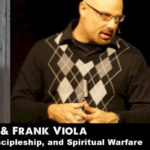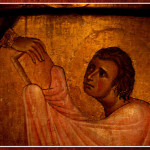We run our website the way we wished the whole internet worked: we provide high quality original content with no ads. We are funded solely by your direct support. Please consider supporting this project.

Part 1 (of 15): Introduction — What’s Up With Jordan Peterson?
Assessing Jordan Peterson’s “12 Rules for Life”
by Greg Boyd
Over the last two years I have, with increasing frequency, been asked what I thought of the views of this maverick Canadian thinker named Jordan Peterson. Sometimes the question was asked by admirers, if not devotees, of his writings and (more commonly) of his online lectures. To these people Peterson is a courageous and brilliant prophet of truth who dares to take on those post-modernist ideologues that are deconstructing the Judeo-Christian values of western culture and transforming our Universities into training camps for left-wing political activism. More often, however, the question has been asked by people who view Peterson as a dangerous academic defender of the patriarchal, bigoted, anti-LGBTQ right, which they of course despise.
The polarization surrounding Peterson has only intensified over the last year since he publicly challenged a recently passed Canadian law requiring Canadians to refer to transgender people with neutral pronounces (e.g. “they,” “ze,” “zir”) on the grounds that refusing to do so constitutes sexual discrimination (link). His bold action, which could have (and still may) cost him his teaching position at the University of Toronto (he is a Professor of Psychology), has landed him smack dab in the middle of the ever-intensifying culture wars that are currently raging throughout western society (especially in America, where this war is most intense).
It was a concerned wife in the church I pastor who finally got me to read Peterson’s book, 12 Rules for Life. As a progressive Christian, she was very concerned that her husband had joined a men’s group that was studying this book. She informed me that her husband, together with the other men in this group, were being captivated by Peterson’s ideas, and she feared this might adversely affect her husband and his peers. “This guy is huge, and he’s dangerous,” she said, “and as a pastor you should really know what he is about!” So, I took this concerned woman’s advice and read the book (it didn’t hurt that she had already bought me a copy).
Having finished the book, I now understand why Peterson is such a polarizing figure. He fearlessly weighs in on all the “hot” topics, and almost always ends up defending the conservative position. As I had heard rumored, Peterson is indeed rabidly opposed to the influence that post-modernism, and especially deconstructionism*, is having in academic circles. Indeed, he believes that Marxism and post-modernism are strongly aligned with one another, and he goes so far as to argue that State funding should be cut off from any academic institution that allows professors to advocate these ideas. Peterson also continually insists on the importance of holding fast to tradition and to religion and thus argues against those who clamor for rapid social change, if not for social revolution. In keeping with this, Peterson affirms the legitimacy of social hierarchies, rails against the imposition of “equal work, equal pay,” argues strongly against identity politics, and continually calls on people to stop blaming society for their problems and to instead take responsibility for their own lives. And, to give one more example, Peterson argues strongly against the common claims that gender differences are largely social constructs and that the world would be a better place if boys were raised more like girls, with all aggression being frowned upon.
Having said that, I must also say that I thoroughly enjoyed reading 12 Rules For Life! In fact, while I strongly disagree with some fundamental aspects of Peterson’s perspective – I will later argue that his worldview is fundamentally anti-Christian — I must confess that 12 Rules For Life is one of the most unique, well-argued, thought-provoking, and over-all engaging books I have read in the last several years. To my surprise, I discovered that Peterson’s conservative stances are just the tip of the iceberg of his remarkably comprehensive and eclectically informed worldview. And I found that Peterson’s reasoning process as well as the particular conclusions he arrives at are were much more nuanced than they are usually presented by his detractors, and often, by his defenders. I have no difficulty understanding why some argue that he is the single most influential contemporary alive today.
Peterson is the kind of clear and rational thinker I enjoy, and benefit from, engaging with. And given his current fame and polarizing influence, I decided I wanted to do more than to merely add yet another general overview of his work in a single blog. Instead, I decided I wanted to do a blog series, of indefinite length, exploring and critically evaluating from a distinctly Christian perspective all the major aspects of his thought, at least as it is expressed in 12 Rules For Life. My goal is to help my readers, and especially those who are inclined toward the left, to appreciate the depth of Peterson’s insight, while also demonstrating the various ways Peterson’s outlook is fundamentally antithetical to the historic-orthodox Christian faith.
So, over each of the next several weeks I will post two or three essays on themes that run throughout Peterson’s 12 Rules of Life. I hope that readers of this blog series will find his thought as engaging, and at points as disturbing, as I do.
Stay tuned!
Greg
Category: General
Tags: Book Reviews, Books, Jordan Peterson
Related Reading

Podcast: A Flexible Faith: The Bonnie Kristian Interview
Dan interviews Bonnie Kristian on her new book: A Flexible Faith: Rethinking What It Means to Follow Jesus Today http://traffic.libsyn.com/askgregboyd/Episode_0344.mp3

Suggested Further Readings for MYTH OF A CHRISTIAN RELIGION
Here is a chapter-by-chapter list of suggested further readings for The Myth of a Christian Religion. If you’d prefer to download the readings as a Word document, click here Suggested Readings. Chapter 1. Giant Jesus Andrews, D. Christi-Anarchy: Radical Spirituality for a New Millennium (Lion, 1999). Andrews insightfully demonstrates – in his thought and…

Podcast: The Frank Viola Interview on INSURGENCE
Greg and Frank talk Kingdom of God. Greg interviews best-selling author Frank Viola about his Insurgence. Why does the allegiance that radical terrorists give to their false cause exceed the allegiance that most Christians today give to Jesus Christ? Have we lost the explosive, earthshaking gospel of the kingdom that Jesus, Paul, and the other…

Part 3: Disarming Flood’s Inadequate Conception of Biblical Authority
Image by Ex-InTransit via Flickr In this third part of my review of Derek Flood’s Disarming Scripture I will offer a critique of his redefined conception of biblical inspiration and authority. I will begin by having us recall from Part I that Flood holds up “faithful questioning” over “unquestioning obedience” as the kind of faith that Jesus…

Part 8 (of 15): Race and Social Hierarchies
Assessing Jordan Peterson’s 12 Rules for Life by Greg Boyd “The degree to which the terrible part of the world manifests itself in your life is proportionate to how insufficient you are….If you got your act together completely, maybe all the suffering would disappear from your life, or at least all the unbearable suffering.” Jordan…

Books I’m Currently Working On
I get asked a lot about what new things I’m working on, and since I’m always working on something, I thought I’d share it with you. Currently, I am working on five books for publication: Discovering the Kingdom: Theological Foundations for Jesus Radicals (with Paul Eddy) (Publisher pending: projected publication date, 2010). Some of the…
